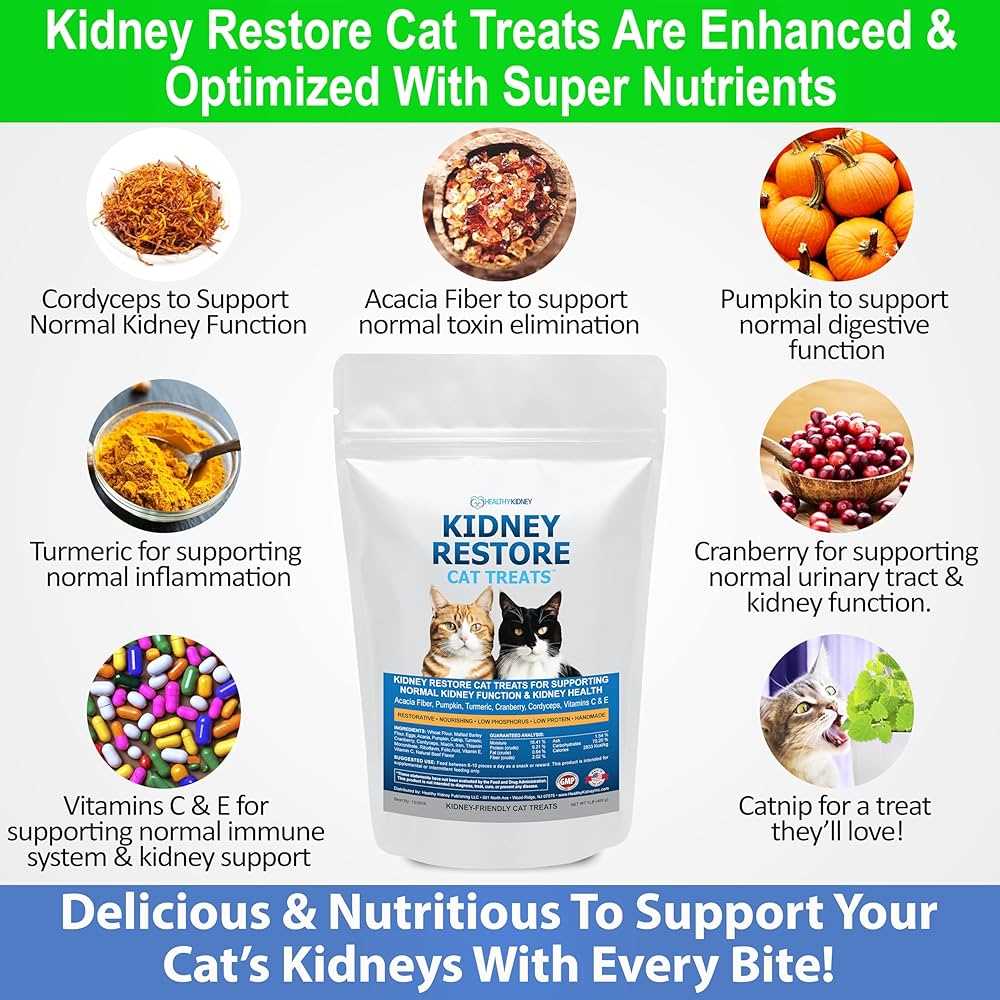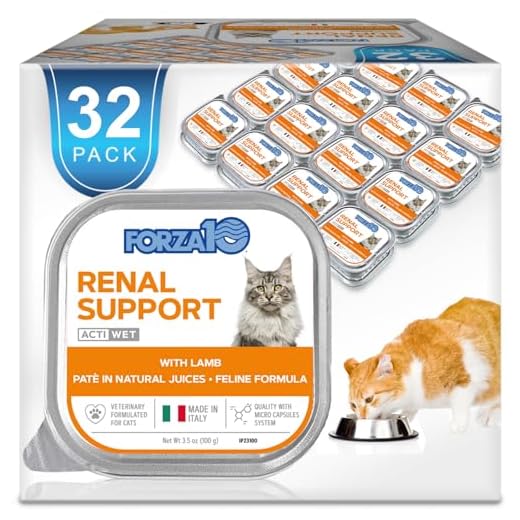




Choosing the right nutrition is critical for felines suffering from renal issues. A tailored meal plan can significantly enhance their quality of life, boost energy levels, and help manage symptoms. This article presents essential insights into appropriate food choices and dietary adjustments that can support your pet’s health.
The content is geared towards pet owners who are looking for reliable guidance on how to feed their furry companions with compromised renal function. By understanding the specific nutritional needs of these animals, caregivers can make informed decisions that benefit their overall well-being.
This text outlines key dietary components, including the importance of hydration, protein levels, and essential nutrients. It highlights suitable food options, discusses the role of low phosphorus and sodium, and offers practical tips for meal preparation. By implementing these recommendations, cat owners can create a supportive environment that aids in managing their pet’s health condition effectively.
Optimal Nutrition for Felines Experiencing Renal Issues
Choosing the right food is pivotal for felines suffering from renal impairment. A suitable regimen typically involves a reduction in protein levels while ensuring high-quality protein sources. This helps to minimize the workload on the kidneys while still providing necessary nutrients.
In addition to protein management, it is essential to focus on phosphorus control. Lowering phosphorus intake can significantly benefit those with compromised renal function. Hydration is also crucial; encouraging water intake can help dilute toxins in the bloodstream.
Key Components of Nutrition
- Protein: Opt for high-quality, easily digestible proteins. Aim for a moderate amount to support muscle maintenance without overburdening the kidneys.
- Phosphorus: Select options with reduced phosphorus content to help alleviate stress on renal function.
- Sodium: Keep sodium levels low to manage blood pressure and reduce fluid retention.
- Omega fatty acids: Incorporate sources rich in omega-3 fatty acids, which can support overall kidney health.
- Hydration: Wet food can be beneficial; it increases fluid intake and supports kidney function.
Regular consultation with a veterinarian is advisable to tailor nutritional needs based on individual health status. Monitoring weight and kidney function through blood tests can help adjust the regimen as necessary.
Understanding Kidney Disease in Cats
Kidney dysfunction in felines is a prevalent condition that often manifests with various symptoms and requires careful management. Early identification is key to prolonging life and enhancing quality of living.
Symptoms may include increased thirst, frequent urination, weight loss, and decreased appetite. Regular veterinary check-ups and blood tests can help detect abnormalities in kidney function.
Factors Contributing to Kidney Dysfunction
Several elements can lead to renal issues, such as:
- Genetics, as certain breeds are predisposed to renal diseases.
- Age, with older animals being at a higher risk.
- Dietary habits, including excessive protein or inadequate hydration.
- Underlying health conditions like hypertension or diabetes.
Monitoring fluid intake and ensuring a balanced intake of nutrients are essential steps in managing this condition. A veterinarian’s guidance is crucial to tailor an appropriate feeding strategy that supports renal health.
Routine testing and early intervention can help manage the signs of kidney dysfunction effectively. Always consult with a veterinary professional regarding any changes in health or behavior.
Nutritional Requirements for Renal Health
Protein intake should be closely monitored, focusing on high-quality proteins that are easily digestible. A moderate protein level can help maintain muscle mass while reducing the workload on the kidneys. It is advisable to consult a veterinarian to determine the appropriate amount based on individual needs.
Phosphorus restriction plays a significant role in supporting renal function. High phosphorus levels can lead to further complications, so choosing foods with lower phosphorus content is beneficial. Regular blood tests can help assess phosphorus levels and guide dietary adjustments.
Additional Nutritional Considerations
Hydration is essential. Providing fresh, clean water at all times encourages adequate fluid intake, which assists in kidney function. Some may benefit from wet food, which contains higher moisture content.
- Low sodium levels are recommended to minimize strain on the cardiovascular system.
- Incorporating omega-3 fatty acids can help reduce inflammation and support kidney health.
- Antioxidants may protect kidney cells from damage, so consider foods rich in vitamins E and C.
Regular veterinary check-ups are crucial to monitor kidney health and adjust nutritional strategies as needed.
Key Ingredients to Include in Your Cat’s Diet
High-quality protein sources are fundamental for maintaining muscle mass and overall health. Lean meats, such as chicken or turkey, are preferable as they provide the necessary amino acids without excessive phosphorus. Fish can also be incorporated, but moderation is key due to potential contaminants and higher phosphorus levels.
Hydration is critical; therefore, including moisture-rich foods can help support kidney function. Wet food options or adding water to dry kibble increase fluid intake, which is beneficial in managing renal health.
Recommended Ingredients
- Low Phosphorus Proteins: Chicken, turkey, and certain types of fish.
- Moisture-Rich Foods: Canned foods or homemade meals with added water.
- Omega-3 Fatty Acids: Fish oil or flaxseed oil to reduce inflammation.
- Antioxidants: Ingredients like blueberries and cranberries can support overall health.
- Fiber: Pumpkin or psyllium to aid digestion and maintain bowel health.
It is crucial to monitor the levels of sodium, as excessive amounts can lead to further complications. A balanced approach to nutrients ensures that your feline companion remains healthy while addressing specific health concerns.
| Ingredient | Benefits |
|---|---|
| Lean Meats | Provides essential proteins |
| Fish Oil | Anti-inflammatory properties |
| Moisture Sources | Supports hydration |
| Fiber Sources | Aids digestion |
Always consult with a veterinarian to tailor the nutrition plan to your pet’s unique needs, ensuring optimal health and well-being.
Foods to Avoid for Cats with Kidney Issues
High-protein options can stress the renal system, leading to further complications. It is essential to limit or eliminate these types of food from the meals of felines facing renal concerns.
Additionally, sodium-rich products may exacerbate hypertension and fluid retention. Monitoring sodium intake is crucial in managing overall health.
Key Foods to Avoid
- Red meat: Lamb, beef, and pork are typically high in protein and can put extra strain on the kidneys.
- Fish: Certain fish types contain high phosphorous levels, which can be detrimental.
- Dairy products: Many felines are lactose intolerant, and dairy can lead to digestive issues.
- Processed foods: Canned and packaged items often contain preservatives and high sodium levels.
- Salty snacks: Items like chips or crackers can introduce excessive salt into their diet.
Reading labels and choosing fresh, whole foods can help ensure a balanced intake without unnecessary strain on renal function. It is advisable to consult a veterinarian for tailored dietary guidance.
Consulting Your Veterinarian for Tailored Meal Plans
Regular consultations with a veterinarian are fundamental for developing a personalized nutrition strategy for your feline companion. A veterinarian’s expertise ensures that the specific needs of your pet are met, considering their health status, age, weight, and any other existing health conditions.
During these consultations, a veterinarian can recommend appropriate ingredients and nutritional supplements, guiding you in making informed choices that support your pet’s overall well-being. This collaboration can significantly improve the quality of life for your furry friend.
Key Points to Discuss with Your Veterinarian
- Current health status and medical history.
- Specific nutritional requirements based on individual health conditions.
- Recommended food brands or homemade options.
- Monitoring and adjusting meal plans as needed.
- Hydration strategies to support kidney function.
Working closely with your veterinarian will lead to a customized approach, ensuring that your pet receives the right nutrients while managing their health condition effectively.
Best diet for cats with kidney problems
Features
| Part Number | FPFZ1310000002 |
| Model | FPFZ1310000002 |
| Size | 3.5 Ounce (Pack of 1) |
Features
| Part Number | 776234 |
| Model | 20090 |
| Release Date | 2013-08-14T00:00:01Z |
| Size | 5.5 Ounce (Pack of 24) |
Features
| Part Number | 3393 |
| Model | 3393 |
| Warranty | 100% statisfaction, or your money back |
| Color | White |
| Is Adult Product | |
| Release Date | 2019-08-31T00:00:01Z |
| Size | 2.9 Ounce (Pack of 24) |
Features
| Part Number | 7252 |
| Model | 7252 |
| Warranty | 100% statisfaction, or your money back |
| Color | White |
| Release Date | 2019-08-31T00:00:01Z |
| Size | 4 Pound (Pack of 1) |
Features
| Part Number | 9007 |
| Model | 9007 |
| Warranty | The Wellness Guarantee: If for any reason you or your cat are not satisfied with this product, return it to Amazon for a refund. |
| Color | Chicken & Turkey Pate Favorites |
| Release Date | 2020-03-31T00:00:01Z |
| Size | 1 Count (Pack of 24) |
Features
| Part Number | 038100179029 |
| Model | 038100179029 |
| Warranty | Purina guarantees outstanding quality and taste. If for any reason you’re not satisfied, simply let Purina know why. Please contact Purina directly at (800) 778-7462 within 60 days of date on receipt for assistance. Or, feel free to mail your original purchase receipt with the price circled, a brief explanation of why you were dissatisfied with our products, the “Best If Used By” date box from the package, along with your name and street address (P.O. Box not accepted) to: Purina, Consumer Services, PO Box 340, Neenah WI 54957 |
| Size | 5.5 Ounce (Pack of 24) |
Video:
FAQ:
What type of diet should I provide for my cat with kidney problems?
For cats with kidney issues, it is important to provide a diet that is low in protein but high in quality. This helps reduce the workload on the kidneys while still supplying essential nutrients. Look for specially formulated kidney diets available at veterinary clinics or pet stores. These diets typically contain controlled levels of phosphorus and sodium, which are beneficial for kidney health. Additionally, ensure your cat stays hydrated, as proper hydration is crucial for kidney function. You can encourage water intake by providing fresh water at all times and considering wet food options.
Are there any specific ingredients I should avoid in my cat’s food if they have kidney problems?
Yes, there are several ingredients to avoid in your cat’s food if they have kidney issues. High levels of protein can put extra strain on the kidneys, so steer clear of foods with excessive meat content. Phosphorus is another mineral to limit, as too much can lead to further kidney damage. Avoid foods that contain artificial additives and preservatives, as these can be hard on your cat’s system. Always consult with your veterinarian for tailored dietary recommendations, as they can suggest safe options that cater to your cat’s specific health needs.









